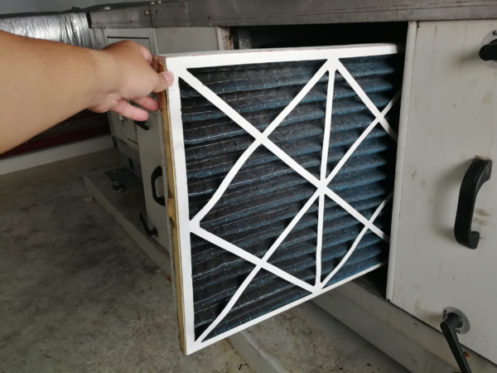Your air filter is an essential part of your heating system. It stops contaminants from entering your furnace and harming the system’s essential components. This filter also helps maintain your home’s air quality by removing debris and allergens before they circulate through your vents. Learning more about the different filter types can help you make the right choice for your household’s comfort this season.
Importance of Air Filters
Many air filters look like thin cardboard boxes with fiberglass or pleated materials inside. The color and texture of the filters will depend on the type of filter you use and its Minimum Efficiency Reporting Value (MERV) rating. These filters will impact your HVAC system’s efficiency as well as your indoor air quality.
Air filters help to keep your HVAC system in optimal condition and running safely. Too much dust and debris inside your heating system will wear down its essential parts faster, making the system run harder to produce heating. This can increase your monthly energy costs and cause it to wear out and fail prematurely. If you leave your clogged filters in place for too long, you may find you require more professional maintenance and repairs.
These filters also have a hand in maintaining your healthy indoor air quality. Without proper air filtration, your home can quickly become more polluted than your outdoor environment. Keeping harmful particulates out of your ducts and HVAC system protects your family’s respiratory health and comfort. At-risk loved ones like children and those with existing conditions like asthma will breathe easier. To ensure your filters are as effective as possible, make sure to choose options that are meant for your unique heating system. You can also stock up to ensure you always have a supply of properly-sized filters. Using the wrong size filter won’t be as effective and may cause more harm than good.
In general, you should change your air filter at least every three months. However, if you have pets, live in a dusty area, or have household members with respiratory issues, you may want to change the filter every month.
Different Types of Air Filters
Pleated filters are one of the most common air filters in residential homes. Typically made of folded polyester or cotton, their many pleats boost their overall surface area. This makes it easier for them to capture larger debris like dust and hair. They’re easy to find in home improvement stores and typically have MERV ratings between 5 and 13. Home systems are generally not able to handle filters with a MERV rating of 14 or more.
For commercial systems, you may be able to use high-efficiency particulate air (HEPA) filters, which offer the equivalent MERV rating of 17 or more. These filters remove up to 99.97% of airborne particulates. HEPA air filters are ideal for buildings that require the highest air quality possible. They’re excellent at maintaining a safe environment for those with allergies and other respiratory conditions.
It’s important to note that while these are some of the most effective filters available, they don’t work well with every HVAC system. Older furnaces, for example, may not be able to pull enough air through the thick filter material. If you’re interested in HEPA filters, consult an HVAC technician to find the best option.
An electrostatic filter is made of paper and cotton fibers. These fibers create static that then attracts pollutants. Electrostatic varieties are available in both reusable and disposable formats, depending on your needs. While you may find this type of filter has no issue collecting smaller allergens, it can struggle to keep hold of larger spores or pet dander. This may not be the best choice for your home if you or your loved ones have respiratory sensitivities.
Finally, washable filters are another popular option praised for their eco-friendliness. Their initial cost is higher than that for other filters, but they can last several years before needing replacing. When they fill up, you remove them and thoroughly rinse them down. After ensuring they’re completely dry, you put them back in place. They typically come with low MERV ratings, but they’re a good investment for those who don’t need specialized filters. Depending on your use and the material, your washable filter could last up to five years. However, they may need to be cleaned as often as every two weeks.
Factors That Impact Filter Lifespan
Some households may only need to switch their filters once or twice over the winter, while others must replace them monthly. The type of filter you use has a huge impact on its lifespan. For example, an inexpensive fiberglass filter is best switched out every month. These filters have low MERV ratings, minimal surface area, and tend to fill up fast. Higher-quality filters may last a few months before they should be replaced.
The size of your home also plays a role in your air filter usage. In larger properties, there’s a higher volume of air to keep warm in the winter, meaning your filter has to process more air. The more floors and rooms you have, the quicker you’ll clog your HVAC filter. Even the number of people in your home can impact your filter’s lifespan. A large family can create and circulate more contaminants around your living spaces. To keep your air clean all year, you’ll need to invest in better filters and replace them regularly.
Not every air filter will work with every HVAC system. Most manufacturers provide filter recommendations with brands that excel with their systems. You should always choose the right size and material. Using a filter that’s too small will let in too many contaminants over time and do little to protect your air quality. Filters also require a little room to expand and shift when the temperature changes. If you choose a filter that’s too large, it won’t sit correctly and can allow unfiltered air to slip around it.
Don’t forget to consider the importance of other environmental factors in your home. These conditions can fluctuate depending on your household, the location of your HVAC system, and your local environment. For example, your filter won’t last as long if your basement regularly struggles with high humidity or large temperature shifts. Living with pets and engaging in poor air quality habits like smoking inside can also wear them down prematurely.
How long your air filter is useful depends on various factors, from the condition of your HVAC system to the material. Choosing the right option for your household can be difficult when you have to consider the size of your home, your family’s health needs, your budget, and more. Rather than risk choosing the wrong filter that harms your air quality, you can bring your HVAC filter needs to experienced indoor comfort specialists.
Local Heating and Air Conditioning Experts
Cool Power LLC has been keeping families and commercial property owners in Ronkonkoma, NY comfortable since 1976. Our NATE-certified technicians are ready 24/7 to provide emergency repair services. We’ve been previously recognized by Angie’s List and have received a Circle of Excellence Award from Lennox. Let us repair or replace your furnace, heat pump, air conditioner, or ductless mini-split. Consider signing up for our maintenance plan to receive exceptional discounts and premium annual tune-ups. Call today to learn more about our indoor comfort services in Ronkonkoma.


